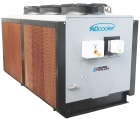Closed-circuit adiabatic cooler

IsoCool has launched a closed-circuit adiabatic dry cooler as an alternative to cooling towers and adiabatic spray systems for rejecting heat from air-conditioning and close-control cooling systems for large retail units, data centres and buildings with a year-round need for air conditioning and climate control such as hospitals and hotels.
Adcooler features variable-speed fans to draw ambient air through honeycomb fill-packs, providing humidification of the incoming warm, dry air. This enables Adcooler to achieve near wet-bulb temperatures and, therefore, exceptional cooling performance, while retaining the advantages offered by dry coolers.
The closed loop significantly reduces water consumption and waste, so scale build-up is minimised.
The Adcooler offers excellent performance in temperatures exceeding 40°C and is designed to automatically switch between dry- and wet-bulb operation according to ambient temperature and humidity.
Standard packaged units have cooling capacities from 80 to 1200 kW, which can be easily expanded thanks to the modular design.
There is a self-draining version that works without glycol to achieve excellent performance and reliability in sub-zero ambient temperatures.







